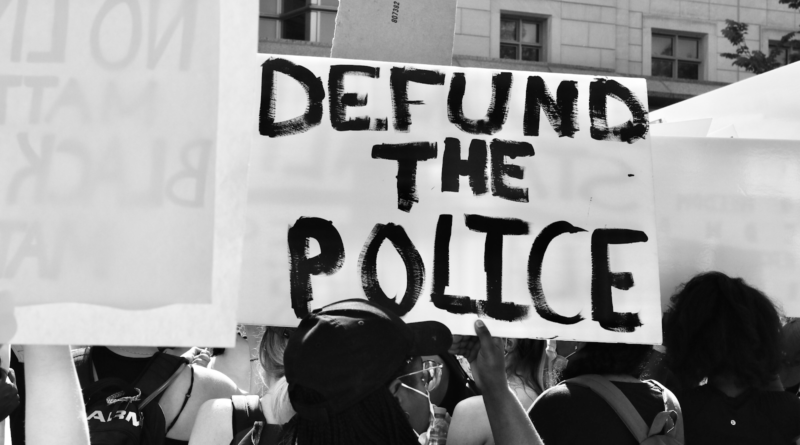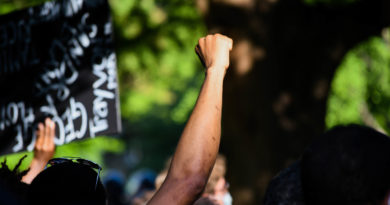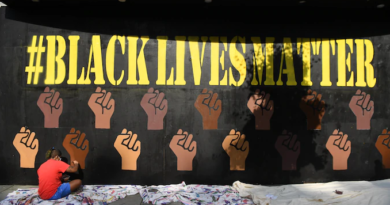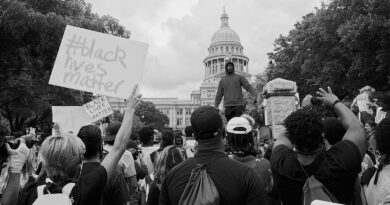Defunding the Police: A Real Plan For Revolutionary Change
Black Lives Matter. A movement. A statement. A piece of truth. Every American should be aware of the struggles their non-white counterparts face at the hands of police officers. Last May it became abundantly clear how often these situations occur after citizens watched the abuse and death of yet another unarmed black man, George Floyd.
Footage of Officer Derek Chauvin kneeling on Floyd’s neck for seven minutes and forty-seven seconds sparked a revolution. It was proof that this issue, regardless of how often we turned a blind eye to it, was still very prevalent within our society. And it also proved to us, that the current President and his administration, along with all the people in Congress, could not care less how many people die on street corners, how many cities are turned into war-zones, or even how many cops can get away with murder. They continued their pandering and performative activism, all to gain our votes, but never to truly solve the issue of police brutality within the country.
When this became abundantly clear, we were forced to search for a solution to these issues in the place of our government: that is when Defund the Police surfaced.
The fact is that cops are not equipped to handle everything; and honestly, no one is. Which is why the police department’s responsibilities should be divided. Defunding the Police does not mean abolish the police: it means take away from the billions and billions of dollars that police institutions are given, and invest it in the community. Data already shows that nine out of ten service calls are for nonviolent encounters, hence why we should leave the cops to handle their criminals, and call elsewhere for these emergencies.
No, we’re not trying to steal the police away from communities, and leave the streets open to lawbreakers, pillagers, and murderers. No, it’s not meant to tear apart our country and leave us vulnerable to all kinds of criminal behavior. And no, it’s certainly not as radical as it may seem.
Often, when people hear the phrase “Defund the Police,” we imagine terrifying things. I certainly know I was doubtful and a bit concerned. But, my acceptance and ultimate support of the idea began with the fundamental understanding of the police institution itself.
You have people who believe that when given a pretty little badge, it comes with the right to maim and hurt anyone if and when they see fit. Additionally, let’s not forget the justice systems and qualified immunities that allow them to get away with it. But, for the longest time, we’ve put our faith in these people. We’ve called them our heroes, officers who swoop in to save the day. We’ve accustomed ourselves to always dialing their number with the belief that all will be well upon their arrival. However, there are two sides to every coin. In this case, one is glowing with over-valued accomplishments, and the other is dripping with the blood of another fallen American.
Now, I’m saying this to highlight a few facts. One of the most significant being the police institution has done a lot for us, and for that I am grateful. But, if our heroes can also be our killers, then what’s the point? If this injustice is taking place on more than one occasion, in every state and city, then why not think of a solution? If they’re negatively affecting our communities, then why should this be allowed to continue?
This is why Defunding the Police is utterly genius. Cops cannot be everywhere at once, and they cannot do everything. People call the police during mental health emergencies, domestic violence cases, health crises, etc, and they are not always qualified to respond to these situations. It’s not within their power to resolve these issues. They’re juggling too many responsibilities. It only makes sense that they’d begin to see everything as criminal activity, and that strapping on their gun and a taser is a necessity for every call.
Certain requests require nonviolent encounters, but officers tend to escalate situations that shouldn’t have ever gone out of hand in the first place.
Take Rayshard Brooks, for example. You have a man sleeping in his car. All Brooks needed was a ride home; instead he received a death sentence. He died because cops could not properly respond to his dilemma. He needed kindness and a guiding hand, but he got guns and cold bullets. Or take George Floyd. Officers were called because of a possibly fraudulent twenty dollar bill. Yet somehow the encounter ended with Floyd being pushed into the gravel like a criminal. Or, perhaps even worse, Dennis Carolino. His aunt requested a mental health team to help her nephew in the midst of a psychotic breakdown. Instead, he was shot and killed on sight by officers who did not fully understand the situation. Regrettably, these are just a few examples.
As it appears, cops have been causing more harm than good in situations that could have easily been de-escalated and resolved by someone more enabled to deal with them. This is why defunding the Police and imbuing those taxpayer dollars into the community is easily the most plausible solution.
Additionally, we’re not only limited to investing those dollars on response teams alone. That money can also go into other under-acknowledged parts of our districts: the parts that encourage growth and nurture brilliant people. For example, it can go into schools to hire more counselors that would help in ending the school-to-prison pipelines. Not only would defunding the Police create jobs, it would build a better society. One without fear and doubt when calling a stranger for assistance, because the fact is that some people just need help, and cops aren’t giving it to them. Defunding them, however, is the best and most rational start to creating a more perfect union. One without innocent people dying, and guilty people walking away. One with real peace and liberty and justice for all.
Because that is what the United States of America is all about, no?




